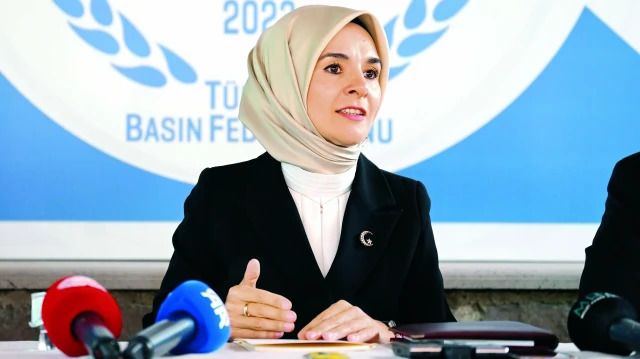Minister Göktaş unveils family-centred reforms to tackle birth rate decline

By News Centre
Minister of Family and Social Services Mahinur Özdemir Göktaş announced a series of major initiatives aimed at strengthening families, regulating children's access to social media, and addressing Turkiye’s declining birth rate. Speaking at the “Anatolian Conversations” event hosted by the Turkish Press Federation, Göktaş outlined her ministry’s vision for a more resilient and socially cohesive nation.
Göktaş emphasized the urgency of introducing legislation to regulate children's use of social media. “We are working on a model unique to our country,” she said. “Initially, we proposed restrictions for children under 13. Then we considered a phased approach for ages 13 to 16. But as a ministry, our recommendation is to set the threshold at under 16.”
She cited Australia’s recent ban on social media for users under 16 as a reference point, noting that while passing laws is straightforward, enforcement poses challenges. “We held two workshops last year. Our model is tailored to Turkiye’s needs, and the general literature supports the 16-and-under approach,” she added.
Göktaş warned that children are particularly vulnerable to disinformation online. “They are exposed to more falsehoods than adults and are constantly presented with unrealistic portrayals of life. Artificial intelligence has permeated every aspect of our lives rapidly. While adults had to adapt, children were born into it and are immersed far more deeply.”
She confirmed that the ministry will present a draft bill as soon as Parliament reconvenes. “We will impose obligations on social media producers. Meta has already met with us. We are strict on this issue and demand greater oversight. Families must be part of this process. Our technical teams are working hard, and we have another meeting scheduled this week. We aim to implement a model that is feasible for Turkiye.”
To support families in balancing work and home life, the ministry has introduced a part-time work regulation. Parents—both mothers and fathers—can benefit from this policy until their child turns six. Göktaş highlighted that Turkiye is making strides in flexible and remote work models, similar to those in Western countries.
She noted that the Ministry of Labor is also working on similar regulations for the private sector. “We want to support families facing the dilemma of ‘career or children,’” she said.
Göktaş elaborated on the “Komşu Anne” (Neighbor Mother) initiative, which aims to strengthen families without disconnecting women and men from the workforce. “This model is already in use in Scandinavian countries, France, Italy, Germany, Belgium, and many others,” she explained.
Women caring for one to five children can create a safe environment in their own homes. Candidates must complete early childhood education through the Ministry of National Education and undergo first aid training. “Our goal is to ensure mothers can leave their children without worry. Students of child development can also participate. We expect qualifications and competence. Private daycare is costly—we want to ease the burden and reduce expenses for families.”
Addressing Turkiye’s demographic challenges, Göktaş revealed that 5,500 young people in earthquake-affected regions were married within six months under the Family and Youth Fund. The ministry also updated its birth assistance system: a one-time payment of 5,000 lira for the first child, monthly payments of 1,500 lira for the second, and 5,000 lira per month for the third and subsequent children. “We’ve transferred 3.5 billion lira to the accounts of 383,684 mothers across Turkiye,” she said.
Göktaş emphasized the importance of the “Terror-Free Turkiye” initiative, aligned with President Erdoğan’s vision. “We play a key role in protecting and strengthening families, women, children, and social unity,” she said.
On August 19, the ministry met with martyr and veteran associations at the Grand National Assembly. “We had the opportunity to voice the concerns and sensitivities of mothers, families, and veterans. As our President stated, we will build this process with the legacies of our martyrs and the contributions of our veterans. We will continue to do our part.”
Göktaş acknowledged the decline in birth rates and the aging population. “Turkiye has always been proud of its young and dynamic population, but like the rest of the world, we are aging,” she said.
She referred to President Erdoğan’s longstanding emphasis on having three children. “He foresaw these days. At the time, there was criticism, but now we see how urgent and serious the situation is. In 2024, our fertility rate was 1.51; this year, it dropped to 1.48—the lowest in history.”
Göktaş warned that this demographic shift will impact not only the present but also the future—affecting social security, the labor force, defense industry, university enrollment, and healthcare over the next 20 years.
She also noted the weakening of traditional family structures and the rise of loneliness as a societal issue. “Digitalization and rapid modernization have led to increased isolation. Elderly people are increasingly turning to nursing homes.”
Here we are to serve you with news right now. It does not cost much, but worth your attention.
Choose to support open, independent, quality journalism and subscribe on a monthly basis.
By subscribing to our online newspaper, you can have full digital access to all news, analysis, and much more.
You can also follow AzerNEWS on Twitter @AzerNewsAz or Facebook @AzerNewsNewspaper
Thank you!
